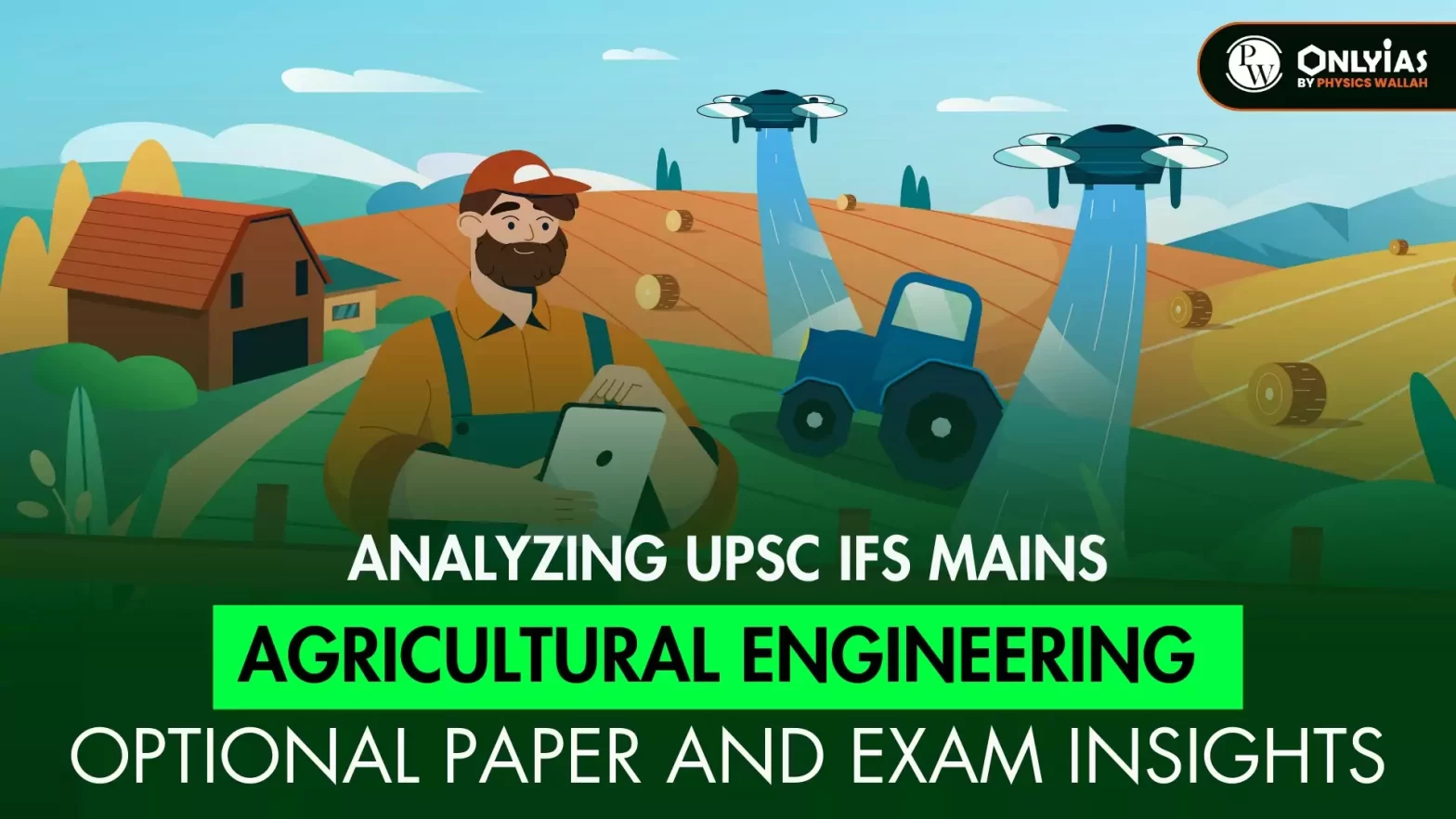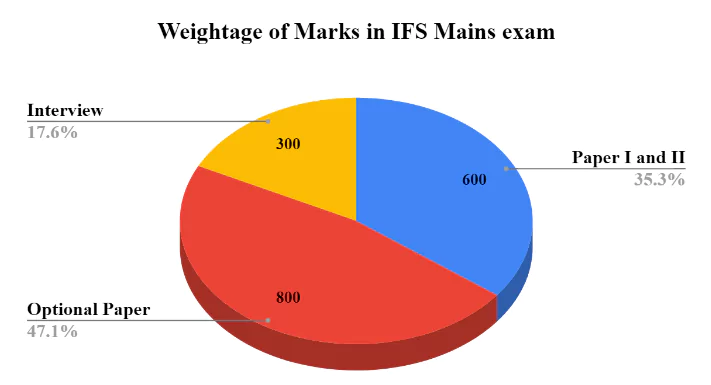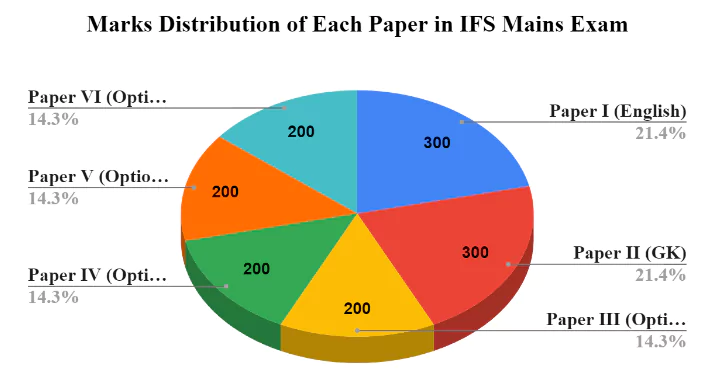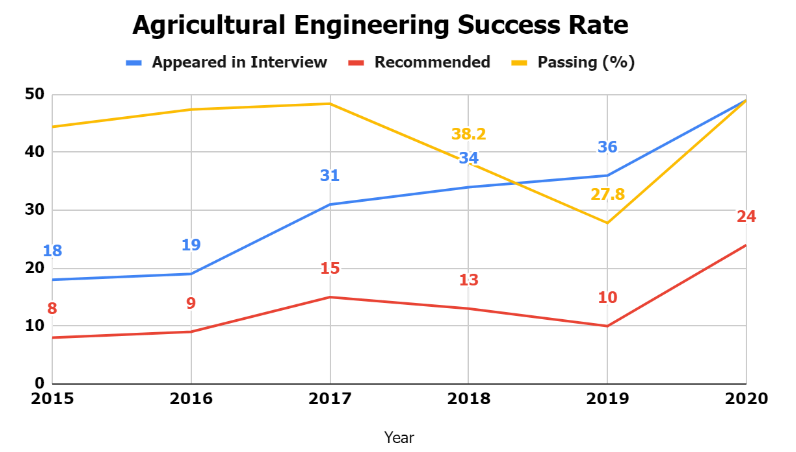The significance of the Agricultural Engineering Optional Paper in UPSC IFS Mains, its structure, success rates, and trends. Learn about its pros and cons, providing insights to help candidates make informed choices and excel in the examination.

The UPSC IFS mains consist of a total of six papers with a total of 1400 marks. The IFS Mains examination includes two papers: one on English and one on General Knowledge. The remaining four papers (Paper I, Paper II, Paper III and Paper IV) cover optional subjects that candidates have chosen during the application form filling process. Since Paper I and Paper II have a maximum of 300 marks each, the remaining 800 marks depend on the optional subjects. It becomes crucial to choose the right optional subject and employ the right strategy so that candidates can score as much as possible. First, we will explore the importance and weightage of optionals, and then we will analyze Agricultural Engineering Optional Paper.
| Download IFS 2023 Agricultural Engineering Optional Paper-01 Download IFS 2023 Agricultural Engineering Optional Paper-02 |
In UPSC IFS mains examination candidates have to choose two optional subjects from the list specified in the notification unlike UPSC IAS mains exam in which candidate has to choose only one optional subject. In IFS exam optional subjects have very high scoring potential because after Paper I and Paper II which consist of 600 marks optional have 800 marks so here optional plays a decisive role in determining your selection as well as to achieve a good rank.

It is evident that in the entire selection process, the optional subject plays a crucial role in preparing for the UPSC IFS exam, as it accounts for almost 48% of the total marks. This substantial portion contributes significantly to the overall evaluation of the entire exam.

Upon further magnification, we can conclude that in the IFS mains examination, the optional section carries almost 58% of the total mains marks. Therefore, scoring well in the optional section, along with Paper I and Paper II, will result in higher overall marks in the exam.
In the UPSC IFS Mains exam, Agricultural Engineering Optional Paper consists of two papers, specifically Paper I and Paper II. Each of these papers carries a weightage of 200 marks, summing up to a total of 400 marks for this optional subject. Among the various optional subjects offered by UPSC in IFS, Agricultural Engineering is one of the 14 optional subjects available to candidates.
| Agricultural Engineering | Syllabus |
| Paper I | Soil and Water Conservation
Scope of soil and water conservation. Mechanics and types of erosion, their causes. Mechanics and types of erosion, their causes. Rainfall, runoff and sedimentation relationships and their measurement. Soil erosion control measures – biological and engineering including stream bank protectionvegetative barriers, contour bunds, contour trenches, contour stone walls, contour ditches, terraces, outlets and grassed waterways. Gully control structures – temporary and permanent – design of permanent soil conservation structures such as chute, drop and drop inlet spillways. Design of farm ponds and percolation ponds. Principles of flood control-flood routing. Watershed Management – investigation, planning and implementation – selection of priority areas and water shed work plan, water harvesting and moisture conservation. Land development – leveling, estimation of earth volumes and costing. Wind Erosion process – design for shelter belts and wind brakes and their management. Forest (Conservation) Act. Aerial Photography and Remote Sensing : Basic characteristics of photographic images, interpretation keys, equipment for interpretation, imagery interpretation for land use, geology, soil and forestry. Remote sensing – merits and demerits of conventional and remote sensing approaches. Types of satellite images, fundamentals of satellite image interpretation, techniques of visual and digital interpretations for soil, water and land use management. Use of GIS in planning and development of watersheds, forests including forest cover, water resources etc. Irrigation and Drainage Sources of water for irrigation. Planning and design of minor irrigation projects. Techniques of measuring soil moisture – laboratory and in situ, Soil-water plant relationships. Water requirement of crops. Planning conjunctive use of surface and ground water. Measurement of irrigation water, measuring devices – orifices, weirs and flumes. Methods of irrigation – surface, sprinkler and drip, fertigation. Irrigation efficiencies and their estimation. Design and construction of canals, field channels, underground pipelines, head-gates, diversion boxes and structures for road crossing. Occurrence of ground water, hydraulics of wells, types of wells (tube wells and open wells) and their construction. Well development and testing. Pumps-types, selection and installation. Rehabilitation of sick and failed wells. Drainage causes of water logging and salt problem. Methods of drainage- drainage of irrigated and unirrigated lands, design of surface, sub-surface and vertical drainage systems. Improvement and utilization of poor quality water. Reclamation of saline and alkali soils. Economics of irrigation and drainage systems. Use of waste water for irrigation – standards of waste water for sustained irrigation, feasibility and economics. Agricultural Structures Site selection, design and construction of farmstead – farm house, cattle shed, dairy bam, poultry shed, hog housing, machinery and implement shed, storage structures for food grains, feed and forage. Design and construction of fences and farm roads. Structures for plant environment – green houses, poly houses and shade houses. Common building materials used in construction – timber, brick, stone, tiles, concrete etc and their properties. Water supply, drainage and sanitation system. |
| Paper II | Farm Power and Machinery
Agricultural mechanization and its scope. Sources of farm power – animate and electro-mechanical. Thermodynamics, construction and working of internal combustion engines. Fuel, ignition, lubrication, cooling and governing system of IC engines. Different types of tractors and power tillers. Power transmission, ground drive, power take off (p.t.o.) and control systems. Operation and maintenance of farm machinery for primary and secondary tillage. Traction theory. Sowing transplanting and interculture implements and tools. Plant protection equipment – spraying and dusting. Harvesting, threshing and combining equipment. Machinery for earth moving and land development – methods and cost estimation. Ergonomics of man-machine system. Machinery for horticulture and agro-forestry, feeds and forages. Haulage of agricultural and forest produce. Agro-energy Energy requirements of agricultural operations and agro-processing. Selection, installation, safety and maintenance of electric motors for agricultural applications. Solar (thermal and photovoltoic), wind and bio-gas energy and their utilization in agriculture. Gasification of biomass for running IC engines and for electric power generation. Energy efficient cooking stoves and alternate cooking fuels. Distribution of electricity for agricultural and agro-industrial applications. Section B Agricultural Process Engineering Post harvest technology of crops and its scope. Engineering properties of agricultural produces and by-products. Unit operations – clearing grading, size reduction, densification, concentration, drying/dehydration, evaporation, filtration, freezing and packaging of agricultural produces and byproducts. Material handling equipment belt and screw conveyors, bucket elevators, their capacity and power requirement. Processing of milk and dairy products – homogenization, cream separation, pasteurization, sterilization, spray and roller drying, butter making, ice cream, cheese and shrikhand manufacture. Waste and by-product utilization – rice husk, rice bran, sugarcane bagasse, plant residues and coir pith. Instrumentation and computer applications in Agricultural Engineering : Electronic devices and their characteristics-rectifiers, amplifiers, oscillators, multivibrators. Digital circuits – sequential and combinational system. Application of microprocessors in data acquisition and control of agricultural engineering process measurement systems for level, flow, strain, force, torque, power, pressure, vacuum and temperature. Computers – introduction, input/output devices, central processing unit, memory devices, operating systems, processors, keyboards and printers. Algorithms, flowchart specification, programme translation and problem analysis in Agricultural Engineering. Multimedia and Audio-Visual aids. |
UPSC Agricultural Engineering Optional Paper from 2018 to 2022 are readily available for aspirants seeking to enhance their preparation. We provided access to the UPSC IFS Agricultural Engineering Optional Paper in PDF format, an invaluable resource for your preparation.
| Year | Paper |
| UPSC IFS Agricultural Engineering Question Paper 2018 | Paper I |
| UPSC IFS Agricultural Engineering Question Paper 2019 | Paper I |
| UPSC IFS Agricultural Engineering Question Paper 2020 | Paper I |
| UPSC IFS Agricultural Engineering Question Paper 2021 | Paper I |
| UPSC IFS Agricultural Engineering Question Paper 2022 | Paper I |
Candidates appearing for the UPSC (Union Public Service Commission) IFS examination must make a thoughtful choice when selecting their optional subject, as it holds substantial weightage in the evaluation process. With a total of 800 marks allotted, the optional subject constitutes approximately 48% of the combined marks for both the written exam and the personality test.
The table below offers a comprehensive overview of the success rate achieved by candidates who opted for Agricultural Engineering as their optional.
| Year | Number of Candidates | ||
| Appeared in Interview | Recommended | Passing (%) | |
| 2015 | 18 | 8 | 44.4 |
| 2016 | 19 | 9 | 47.4 |
| 2017 | 31 | 15 | 48.4 |
| 2018 | 34 | 13 | 38.2 |
| 2019 | 36 | 10 | 27.8 |
| 2020 | 49 | 24 | 49 |

By examining the past papers of the Agricultural Engineering Optional Paper, we can identify a trend in the types of questions asked. There is also a noticeable shift in the themes of the questions. Understanding the UPSC IFS Agricultural Engineering Question Paper Trend Analysis is advantageous, as it allows candidates to streamline their preparation effectively and enhance their performance in this optional subject.
Please note that before selecting agricultural engineering as your optional subject, carefully weigh these disadvantages against the advantages and consider your own background, interests, and the time you can dedicate to preparation.
| Must Read | |
| NCERT Notes For UPSC | UPSC Daily Current Affairs |
| UPSC Blogs | UPSC Daily Editorials |
| Daily Current Affairs Quiz | Daily Main Answer Writing |
| UPSC Mains Previous Year Papers | UPSC Test Series 2024 |
Both subjects have some overlapping topics but not completely the same.
There are two papers of Agricultural Engineering each paper divided into two parts.
According to the list this combination of subjects is not allowed to choose.

<div class="new-fform">
</div>